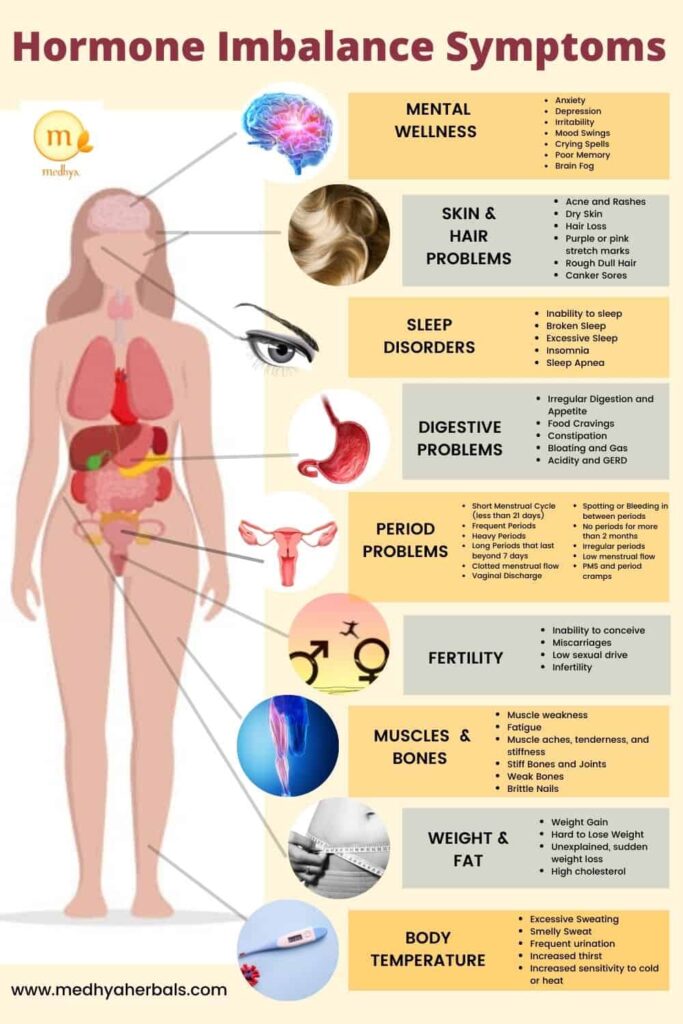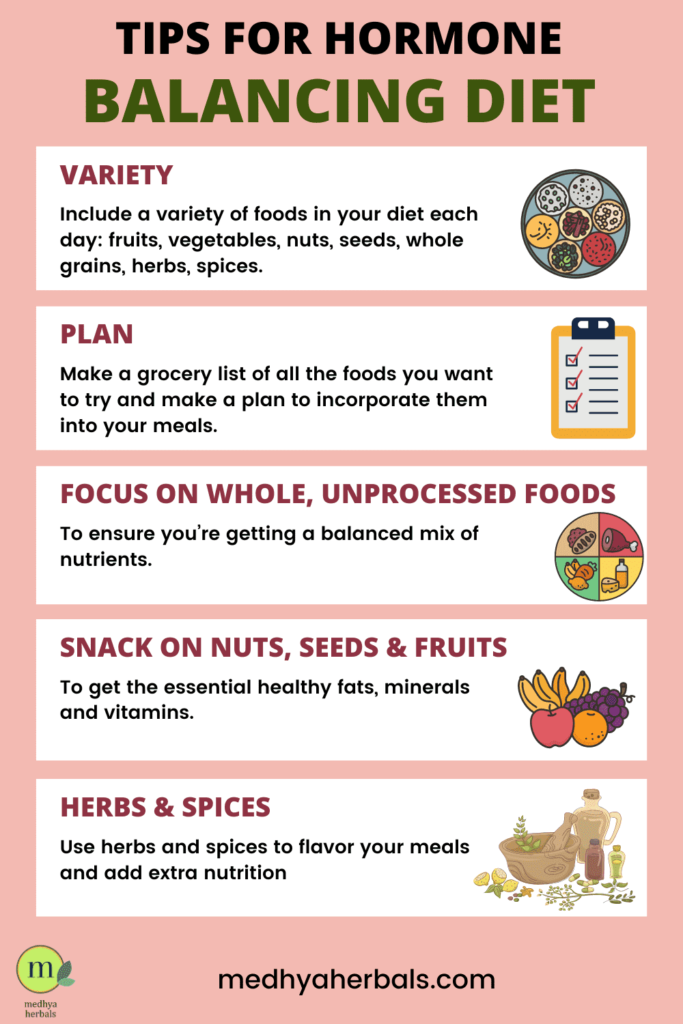Every parent hopes for their child’s teenage years to be a time of growth, discovery, and good health. However, the teenage phase is also synonymous with hormonal fluctuations, especially in girls. You might have heard the term “hormone imbalance in teenage girl” and wondered what it really means. It’s not just about mood swings or acne; it’s a complex issue that can influence various aspects of a young girl’s well-being. The body’s delicate dance of hormones dictates everything from growth spurts to emotional well-being. But what happens when there’s a misstep in this intricate ballet? The results can be subtle or glaringly apparent.
From unexpected weight changes to irregular periods, the symptoms of a teenage hormonal imbalance can be both bewildering and concerning for parents and teenagers alike. Fortunately, you’re in the right place. In this article, we’ll delve deep into the causes, signs, and solutions for hormonal imbalances in teenage girls. With expertise rooted in Ayurvedic principles and a commitment to women’s health, we promise a journey of insight and actionable information. Stay with us as we navigate this crucial topic, ensuring you’re well-equipped to support the young women in your life.
Understanding Hormone Imbalance in Teenage Girls: Causes and Symptoms
Hormonal imbalance refers to a situation where there is either an excess or a deficiency of one or more hormones in the bloodstream. Hormones are chemical messengers produced by endocrine glands that regulate various bodily functions such as growth, metabolism, and mood. In teenage girls, the balance of these hormones is especially crucial as they undergo puberty, a phase characterized by rapid physical, emotional, and psychological changes.
Common Causes of Hormonal Imbalance in Teenage Girls
Several factors can trigger hormonal imbalances in teenage girls:
- Puberty: As the primary cause, puberty introduces a surge of hormones, especially estrogen and progesterone. This surge is natural but can sometimes lead to temporary imbalances.
- Stress: Chronic stress can increase the production of cortisol, the stress hormone. Elevated cortisol levels can disrupt the balance of other hormones.
- Poor Diet and Nutrition: Consuming a diet high in processed foods, sugars, and unhealthy fats can interfere with hormone production and balance.
- Environmental Factors: Exposure to endocrine-disrupting chemicals, commonly found in some plastics, cosmetics, and pesticides, can influence hormone levels.
- Medical Conditions: Conditions like Polycystic Ovary Syndrome (PCOS) or thyroid disorders can result in hormonal imbalances.
- Medications and Birth Control: Some medications, especially hormonal birth control, can alter the hormonal balance in the body.

Symptoms of Hormonal Imbalance in Girls
Recognizing the symptoms of hormonal imbalance is the first step towards addressing the issue. Some common symptoms include:
- Irregular Menstrual Cycles: Either too frequent, infrequent, or entirely absent periods.
- Mood Fluctuations: Unexpected mood swings, heightened emotions, or symptoms of depression and anxiety.
- Skin Issues: Acne breakouts, excessively oily or dry skin, and unexplained rashes.
- Weight Changes: Sudden weight gain or loss without significant changes in diet or activity levels.
- Sleep Disturbances: Trouble falling asleep, staying asleep, or experiencing chronic fatigue.
- Hair Changes: Thinning of hair, excessive hair growth in unusual places, or hair loss.
- Digestive Problems: Bloating, constipation, or diarrhea without any apparent dietary causes.
Understanding these causes and symptoms is vital for early intervention and seeking the right treatment or lifestyle changes to restore hormonal balance.
Diagnostic Measures: How to Check for Hormonal Imbalance
As a parent or guardian, understanding the nuances of your child’s behavior and physical changes can be the first step in identifying a hormonal imbalance. While some symptoms like mood swings or acne might be dismissed as typical teenage behavior, persistent or exaggerated manifestations should raise concerns. Here are some signs to watch for:
- Prolonged or Severe Acne: While it’s common for teenagers to have occasional breakouts, persistent, severe acne might indicate a deeper hormonal issue.
- Irregular Menstrual Cycles: If your child’s periods are highly unpredictable, absent, or particularly painful, it might be time to consult a physician.
- Unusual Hair Growth or Loss: Noticeable hair thinning or growth in uncommon areas (like the face) can be a sign.
- Sleep Issues: Chronic insomnia or oversleeping might be related to hormonal fluctuations.
- Unexplained Weight Changes: Sudden weight gain or loss without significant changes in diet or activity could be indicative.
How can I test my daughter’s hormones?
To get a clear picture of a teenager’s hormonal health, several tests can be conducted:
- Blood Tests: The most common method. It measures levels of specific hormones in the bloodstream.
- Saliva Tests: Often used to check cortisol levels and sometimes other hormones.
- Urine Tests: Useful for understanding the body’s production and disposal of hormones over a 24-hour period.
Checking hormonal imbalance at home
While clinical tests offer the most accurate results, there are at-home test kits available for preliminary assessments:
- At-home Saliva Testing Kits: Available for testing cortisol and sometimes other hormones. They require the user to provide multiple saliva samples throughout the day.
- At-home Blood Spot Testing: These kits involve pricking a finger and collecting a small amount of blood on a test card.
- Digital Apps: Some digital platforms offer symptom tracking that can provide insights based on reported symptoms, although these are not as definitive as laboratory tests.
However, it’s crucial to note that while at-home tests can give an overview, they should not replace professional medical advice or clinical testing.

The Dietary Impact: Foods to Embrace and Avoid for Hormonal Health
Foods to Avoid in Hormonal Imbalance
Diet plays a pivotal role in maintaining hormonal balance. Some foods can disrupt this balance, leading to or aggravating hormonal imbalances in teenage girls. Here are some foods to be cautious of:
- Refined Sugars and Carbohydrates: Excessive intake can lead to insulin resistance, affecting hormone balance.
- Dairy Products: Some individuals are sensitive to the hormones present in milk and other dairy products, which can exacerbate acne and other hormonal symptoms.
- Caffeine: High caffeine consumption can alter estrogen levels and other hormones.
- Soy Products: They contain phytoestrogens, which can mimic estrogen in the body, potentially causing imbalances.
- Processed Foods: Often contain additives, chemicals, and unhealthy fats that can interfere with hormone production.
- Alcohol: Can affect liver function, which plays a role in hormone regulation.
Foods Beneficial for Hormonal Health
On the brighter side, numerous foods can help maintain or restore hormonal balance:
- Flaxseeds: Rich in lignans and omega-3 fatty acids, they can help in balancing estrogen levels.
- Broccoli and Brussel Sprouts: Cruciferous vegetables can help in detoxifying excess estrogens from the body.
- Fatty Fish: Sources like salmon and mackerel, rich in omega-3 fatty acids, can aid in hormone production and reduce inflammation.
- Quinoa: A great source of protein and fiber, it can help maintain steady insulin levels.
- Nuts: Especially almonds and walnuts, can provide essential fatty acids necessary for hormone production.
- Avocado: Rich in fiber, potassium, and healthy fats, it can help in balancing hormones.
Fruits and their Impact on Hormonal Health
Fruits, with their rich array of vitamins, minerals, and antioxidants, can have a positive impact on hormonal health:
- Berries: Blueberries, strawberries, and raspberries are rich in antioxidants and can help in reducing inflammation and oxidative stress, supporting hormone balance.
- Apples: They contain quercetin, an antioxidant that can aid in regulating estrogen balance.
- Citrus Fruits: Oranges, lemons, and grapefruits are rich in vitamin C, which can support adrenal function and regulate cortisol levels.
- Bananas: Rich in vitamin B6 and potassium, they can help in regulating menstrual cycles and alleviating PMS symptoms.
- Pomegranates: They have the potential to reduce estrogen levels, helping in balancing hormones.
Incorporating a mix of these beneficial foods and fruits into one’s diet, while minimizing the intake of disruptive foods, can be a significant step towards achieving and maintaining hormonal balance.
Essential Vitamins for Maintaining Hormonal Equilibrium
Vitamins play a vital role in numerous physiological processes, including the production and regulation of hormones. Some vitamins are particularly significant when it comes to maintaining hormonal equilibrium:
- Vitamin D: Often referred to as the “sunshine vitamin”, Vitamin D can influence the synthesis of thyroid hormones. A deficiency can lead to an imbalance in thyroid hormones and affect calcium metabolism.
- Vitamin B6: This vitamin aids in the production of neurotransmitters and can alleviate symptoms of PMS by helping to regulate estrogen and progesterone levels.
- Vitamin E: Known for its antioxidant properties, Vitamin E can help reduce menstrual cramping and breast tenderness, symptoms often linked to hormonal fluctuations.
- Vitamin C: Supports the adrenal glands and helps maintain appropriate cortisol levels, especially during times of stress.
While each of these vitamins plays a role in hormonal balance, it’s crucial to understand that no single vitamin is a silver bullet. Hormonal balance is achieved through a combination of factors, including a well-rounded intake of various nutrients.
Dietary Sources and Supplements
To ensure an adequate intake of these essential vitamins, it’s crucial to consume a diverse and balanced diet. Here’s where you can find these vitamins naturally:
- Vitamin D: Sun exposure is a primary source. Dietary sources include fatty fish (like salmon and mackerel), fortified dairy products, and egg yolks.
- Vitamin B6: Found in foods like turkey, bananas, chickpeas, potatoes, and fortified cereals.
- Vitamin E: Rich sources include almonds, sunflower seeds, spinach, and broccoli.
- Vitamin C: Abundant in citrus fruits (oranges, lemons), strawberries, bell peppers, and broccoli.
For those who may struggle to get enough of these vitamins through diet alone, supplements can be a viable option. However, it’s essential to consult with a healthcare professional before starting any supplementation, as excessive intake can have adverse effects and may interact with other medications or conditions.
Natural Remedies: Restoring Hormonal Balance the Ayurvedic Way
Ayurveda, the ancient Indian system of medicine, offers a holistic approach to health, including hormonal balance. For immediate relief, Ayurveda recommends:
- Adopting a Balanced Diet: Incorporate warm, cooked, and easily digestible foods. Limit cold, raw, and processed foods which can aggravate the doshas, leading to imbalances.
- Herbal Remedies: Herbs like Ashwagandha, Shatavari, and Turmeric can be beneficial. Ashwagandha, for instance, helps in balancing cortisol levels, while Shatavari supports female reproductive health.
- Adequate Sleep: Ensure you get 7-8 hours of restful sleep, as per Ayurveda’s emphasis on the body’s natural rhythms.
- Oil Massage (Abhyanga): A daily self-massage using warm sesame oil or coconut oil can help in reducing Vata, which when aggravated, can lead to imbalances.
Long-term Strategies to Restore Hormonal Balance Naturally
For long-term hormonal balance, Ayurveda suggests a combination of lifestyle, dietary, and therapeutic approaches:
- Regular Detox (Panchakarma): Undergoing Panchakarma, Ayurveda’s detoxification process, annually or biannually can help in cleansing the body and resetting hormonal balance.
- Mindful Eating: Paying attention to not just what you eat, but how you eat. Eating in a calm environment and chewing food thoroughly can aid digestion and prevent imbalances.
- Yoga and Meditation: Practices like Pranayama (breathing exercises) and specific yoga postures can aid in balancing hormones.
- Herbal Formulations: Long-term intake of Ayurvedic formulations, under the guidance of an Ayurvedic physician, can support hormonal health.
Importance of Professional Consultation
While Ayurvedic principles offer valuable insights and remedies, it’s crucial to combine this knowledge with modern diagnostic methods:
- Diagnostic Tests: A healthcare provider can order blood, saliva, or urine tests to measure hormone levels.
- Symptom Assessment: A thorough discussion about symptoms, their onset, and severity can provide clues about hormonal imbalances.
- Physical Examination: This can offer insights into signs of hormonal imbalances like weight changes, skin conditions, or hair growth patterns.
- Personal and Family Medical History: Past medical conditions or familial patterns can indicate a predisposition to hormonal imbalances.
Combining Ayurvedic wisdom with modern diagnostic methods ensures a comprehensive and informed approach to addressing hormonal imbalances in teenage girls.
Conclusion
Navigating the tumultuous waters of teenage hormonal imbalances can be overwhelming for both the young girls experiencing them and the guardians watching over them. The myriad of symptoms, combined with the challenges of adolescence, can make finding effective relief seem like an insurmountable task. We understand the yearning for lasting solutions and the heartache of seeing temporary fixes falter.
Ayurveda, with its holistic approach, delves deep into the root causes rather than just skimming the surface. It offers not just temporary alleviation but strives for a permanent balance, ensuring that the body’s natural rhythms and systems work in harmony. Medhya Herbals stands firm in its commitment to this age-old wisdom, offering personalized treatment plans tailored to each individual’s unique constitution and needs.
If you or a loved one is grappling with the challenges of hormonal imbalances, don’t tread this path alone. Schedule a consultation with Medhya Herbals’ Ayurvedic Doctors. Let’s embark on a journey towards lasting wellness together.
FAQ
How do I know if my child has hormonal imbalance?
Recognizing a hormonal imbalance in your child can be challenging, given the natural fluctuations of adolescence. However, persistent or exaggerated symptoms such as irregular menstrual cycles, severe acne, unexplained weight changes, mood swings, sleep disturbances, or unusual hair growth patterns can be indicative. If your child consistently exhibits such signs, it might be wise to consult a healthcare professional for a more in-depth assessment.
What is a hormonal imbalance in a 15 year old?
In a 15-year-old, hormonal imbalance refers to a disruption in the typical levels of hormones produced during adolescence. As teenagers undergo puberty, they experience a surge in hormones like estrogen and progesterone, which regulate growth, menstrual cycles, and other bodily functions. An imbalance can arise due to factors like stress, poor diet, medical conditions, or exposure to environmental toxins. This can result in symptoms like irregular periods, mood fluctuations, sleep issues, or skin problems, making it essential to address for overall well-being.
How do I know if my child has hormone deficiency?
Hormone deficiency in a child often manifests as developmental delays or growth issues. For instance, your child might be noticeably shorter than their peers, show slower developmental milestones, or experience delayed or absent signs of puberty. Other symptoms can include chronic fatigue, increased sensitivity to cold, and dry skin. Such deficiencies might arise from congenital conditions, issues with the pituitary gland, or other medical reasons. If you suspect a hormone deficiency, it’s crucial to consult a pediatric endocrinologist or healthcare provider for accurate diagnosis and guidance.
What age should I get my hormones checked?
The onset of puberty, which can begin anywhere from 8 to 14 years for girls, is a significant milestone when hormonal changes become pronounced. It’s advisable to consider hormone checks if there are noticeable symptoms of imbalance during the early teenage years. However, routine checks might not be necessary unless there are specific concerns. Most experts recommend that by age 25, women should start getting regular hormonal assessments, especially if they experience symptoms or are planning for pregnancy. However, always consult with a healthcare provider about the best timeline for individual needs.
How do you check if your hormones are okay?
Hormonal imbalances often manifest through symptoms like irregular menstrual cycles, mood swings, unexplained weight changes, and persistent acne. If such symptoms are observed, it’s advisable to consult a physician. They can recommend diagnostic measures like blood tests, saliva tests, or urine tests to assess hormone levels and determine if there’s an imbalance.
Can hormonal imbalance fix itself?
Sometimes, minor hormonal imbalances can self-regulate, especially if they are caused by short-term factors like stress or dietary changes. However, persistent or severe hormonal imbalances often require intervention, either through lifestyle changes, dietary adjustments, or medical treatment.
References
- https://www.aocd.org/page/Acne
- http://www.aad.org/public/diseases/acne/really-acne/adult-acne
- http://www.tandfonline.com/doi/full/10.1080/00365513.2018.1555858
- https://rarediseases.org/rare-diseases/cushing-syndrome/
- http://www.hormone.org/diseases-and-conditions/breast-cancer
- https://www.ncbi.nlm.nih.gov/pmc/articles/PMC7432488/
- https://medlineplus.gov/hyperthyroidism.html
- http://www.niddk.nih.gov/health-information/endocrine-diseases/hypothyroidism
- http://www.fda.gov/medical-devices/home-use-tests/menopaus
- http://www.womenshealth.gov/menopause/menopause-basics
- http://www.womenshealth.gov/a-z-topics/polycystic-ovary-syndrome
- https://medlineplus.gov/primaryovarianinsufficiency.html
- https://www.endocrine.org/patient-engagement/endocrine-library/primary-ovarian-insuffiency
- https://medlineplus.gov/puberty.html
- http://www.nichd.nih.gov/health/topics/puberty
- https://www.ncbi.nlm.nih.gov/books/NBK279105/#gynecomastia-etiolog.INTRODUCTION
- https://medlineplus.gov/lab-tests/testosterone-levels-test

